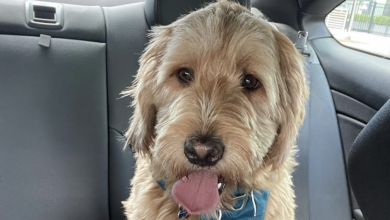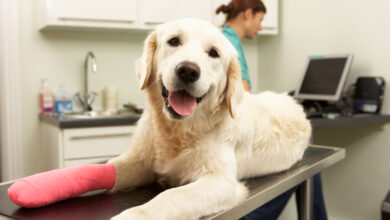When do Dobermans get old?

1. At what age is a Doberman considered a senior dog?
A Doberman is generally considered a senior dog when he is between 7 and 8 years old. This can vary depending on their overall health, genetics, and lifestyle. As they reach this age, you may begin to notice signs of aging such as slower movements, increased napping, and graying around the muzzle. Regular veterinary check-ups become increasingly important to monitor their health and address any potential problems early. Proper care, a balanced diet, and appropriate exercise are important to ensure they maintain a good quality of life as they age. Dobermans, known for their loyalty and protective nature, can still exhibit these traits strongly even as they enter their later years.
2. What are the common signs of aging in Doberman dogs?
Common signs of aging in Dobermans include graying of the coat, especially around the muzzle and eyes, decreased energy levels, and stiffness or difficulty moving, which can be signs of arthritis. You may also notice changes in their hearing and vision, such as cloudy eyes or difficulty responding to sounds. Weight fluctuations, gaining or losing weight more easily, may also occur. Behavioral changes, such as sleeping more, losing interest in activities they once enjoyed, or becoming more anxious, may be evident. Regular veterinary care is essential to managing these signs and ensuring your Doberman is comfortable as they age. Providing joint supplements, a balanced diet, and gentle exercise can help alleviate some of the physical effects of aging. Keeping a close eye on their behavior and health will allow you to make necessary adjustments to their care routine, ensuring they stay happy and healthy throughout their later years.
3. How can I help my senior Doberman stay active?
To help your senior Doberman stay active, focus on low-impact exercises that are gentle on his joints. Short, regular walks are beneficial, providing physical activity without overexertion. Swimming is a great option, as it provides full-body exercise without putting stress on his joints. Engage him in gentle play sessions with his favorite toys, making sure the activities are not too strenuous. Mental stimulation is also important; consider puzzle toys, training new tricks, or scent games to keep his mind sharp. Regular veterinary check-ups are important to tailor an exercise plan to your dog’s unique needs and abilities. Additionally, maintaining a healthy weight through diet and exercise can prevent additional stress on his joints. Providing a comfortable bed and avoiding activities that require jumping or sudden movements can also help protect their joints and keep them active and happy.
4. What dietary changes should I consider for my elderly Doberman?
As your Doberman gets older, you may need to adjust his diet to meet his changing nutritional needs. Senior dogs often need fewer calories due to reduced activity levels, so a lower-calorie diet can help prevent weight gain. Look for a high-quality dog food specifically designed for senior dogs, which often includes more fiber for digestive health and joint supplements like glucosamine and chondroitin. Make sure he always has access to fresh water and monitor his food intake to avoid overeating. You may also consider adding supplements to support his overall health, such as omega-3 fatty acids for joint and skin health. It is essential to consult your veterinarian for personalized dietary recommendations based on your Doberman’s specific health needs. Regularly monitoring their weight and adjusting their diet as needed will help maintain their overall health and well-being as they age.
5. How often should I take my senior Doberman to the vet?
Senior Dobermans should visit the veterinarian at least twice a year for regular checkups. These visits allow the veterinarian to monitor the dog’s health, detect any age-related problems early, and adjust the care plan as needed. During these visits, the veterinarian may perform blood tests, perform a dental exam, and assess the dog’s weight and mobility. More frequent visits may be necessary if your dog has chronic conditions or is showing signs of illness. Regular veterinary care is essential to managing the health of a senior dog and ensuring that they remain comfortable and happy. Early detection of health problems can lead to more effective treatments and better control of chronic conditions. Maintaining open communication with your veterinarian about any changes in your Doberman’s behavior or health can help ensure that he receives the best possible care.
6. What are some common health problems in older Dobermans?
Common health problems in older Dobermans include arthritis, which causes pain and stiffness in the joints, making it difficult for them to move. Heart disease, especially dilated cardiomyopathy, is also common and can lead to difficulty breathing, coughing, and reduced stamina. Cancer, including lymphoma and osteosarcoma, is another serious concern in older Dobermans. They can also suffer from hypothyroidism, which can cause weight gain, lethargy, and skin problems. Dental disease is also common, leading to bad breath, tooth loss, and difficulty eating. Regular veterinary checkups, a healthy diet, and proper exercise can help control these conditions and improve your dog’s quality of life as he ages. Early detection and treatment are important to effectively managing these health problems, so always be vigilant about your Doberman’s health and behavior.
7. How can I make my home more comfortable for my senior Doberman?
To make your home more comfortable for your senior Doberman, consider providing orthopedic dog beds that provide extra support for their joints. Place these beds in quiet, accessible areas where your dog likes to rest. Use non-slip mats on the floor to prevent slips and falls, especially if you have hardwood or tile floors. Install ramps or steps to help them get onto furniture or into the car without straining their joints. Make sure their food and water bowls are at a comfortable height to reduce strain on their neck and back. Regular grooming and nail trimming can also help them move around more comfortably. Creating a quiet, predictable environment can reduce anxiety and help your senior Doberman feel more secure. Providing gentle, consistent exercise and mental stimulation will also contribute to their overall health and well-being.
8. How can I control arthritis in my senior Doberman?
Managing arthritis in your senior Doberman involves a combination of veterinary care, diet, exercise, and home adjustments. Consult your veterinarian for appropriate prescription medications, such as anti-inflammatory or pain medications, and consider supplements such as glucosamine and chondroitin to support joint health. Maintain a healthy weight to reduce stress on joints, and engage in low-impact exercises such as swimming or short, gentle walks. Provide orthopedic bedding to provide extra support for joints, and use ramps or steps to minimize jumping. Regular massage and physical therapy can also help reduce arthritis pain and improve mobility. Keeping their environment comfortable, with soft bedding and non-slip surfaces, can help prevent further stress on their joints. Closely monitoring their condition and adjusting their care plan as needed will help them manage their arthritis effectively and improve their quality of life.
9. What mentally stimulating activities are suitable for senior Dobermans?
Mental stimulation is important for older Dobermans to keep their minds sharp and prevent cognitive decline. Puzzle toys with treats can stimulate their problem-solving skills and keep them entertained. Teach them new, gentle games or commands that are both fun and mentally stimulating. Interactive play sessions, such as hide-and-seek with treats or toys, can also keep their minds active. Regular social interactions with people and other friendly dogs can provide stimulation and mental enrichment. Finally, providing a variety of toys and changing them regularly can help maintain their interest and prevent boredom. Engaging their sense of smell with scent-based games and activities can also be very stimulating for Dobermans, as they have an excellent sense of smell. Keeping their environment enriched with new experiences and challenges will help maintain their cognitive health and overall happiness.
10. How do I know if my senior Doberman is in pain?
Signs that your senior Doberman may be in pain include behavioral changes, such as increased irritability, restlessness, or withdrawal. They may also appear reluctant to move, climb stairs, or jump on furniture, and you may notice them limping or moving more slowly than usual. Changes in appetite, excessive licking or chewing in certain areas, and vocalizations such as whining or whimpering can also indicate pain. If you observe any of these signs, consult your veterinarian for a thorough examination and appropriate pain management options to ensure your dog’s comfort and well-being. Early detection and treatment of pain can significantly improve your Doberman’s quality of life. Regular checkups and open communication with your veterinarian about any changes in your dog’s behavior or health are essential to effectively managing pain and maintaining their comfort.




